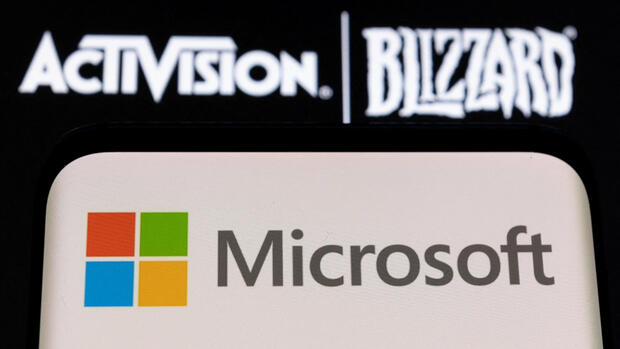According to the European Commission, the deal does not undermine Microsoft’s competition.
(Photo: Reuters)
Brussels, Dusseldorf The European Union has given the green light to the biggest takeover to date in the video games industry. The software company Microsoft may swallow the games manufacturer Activision Blizzard subject to conditions, the EU competition authority announced on Monday.
The authority of Commission Vice Margrethe Vestager described the concessions offered by Microsoft as sufficient. The group had given written assurances that Activision bestsellers such as the first-person shooter “Call of Duty” could continue to run on competing platforms such as Sony’s “PlayStation” – at least for a period of ten years. This represents “a significant improvement compared to the current situation,” the commission said.
Brussels comes to a different assessment than the British competition regulator. A few weeks ago, the Competition and Markets Authority (CMA) refused approval for the $69 billion takeover.
The British fear that Microsoft would then have a dominant position in the games industry. The competition, above all the Japanese company Sony, fears Call of Duty, one of the best-selling game series of all time. If the international bestseller were only offered on Microsoft services, the fear was that fans of the series would also only play there.
EU in conflict with UK and USA
With Brussels, Microsoft has now won at least one of the three major competition authorities on its side. It is questionable whether it will help in the end, because the US competition authority FTC has similar concerns as the British. She has filed a complaint against the takeover, and the first hearing is scheduled for August.
Industry insiders suspect that Microsoft doesn’t want to push through the deal at any price. Above all, the time factor should play a role. However, a withdrawal should be associated with a significant compensation payment to Activision-Blizzard.
With the purchase of the leading game manufacturer, Microsoft wants to upgrade its “Game Pass” cloud offer in particular. The group has been trying for some time to make the successful business with computer and video games independent of gaming systems. For example, the sale of game consoles – not only in the case of Microsoft’s “XBox” – is traditionally seen as a subsidy business. The money is made with the games.
In the console sector, Sony is the market leader with its “PlayStation”. The Japanese also offer an online gaming service, but it is tied to the hardware. In the antitrust proceedings, Microsoft presented itself as an underdog compared to Sony.
>> Read also: Games turnover in Germany increases to almost ten billion euros – domestic companies hardly benefit
The company advertised that it would bring popular titles like Call of Duty to more platforms, reaching millions of new players. As proof, Microsoft had announced a partnership with graphics chip specialist Nvidia, which also operates an online gaming platform. However, this in turn has satisfied Nvidia itself, which has expressed similar concerns as Sony.
Activision Blizzard boss Bobby Kotick praised the EU Commission’s “extremely thorough” process. He said France-based Activision has deep roots in Europe and will continue to invest. The number of employees will continue to grow thanks to “the determined but pragmatic action” of the European governments. Kotick himself is controversial as CEO. Prior to the takeover bid, his resignation had already been expected due to the inadequate processing of allegations of abuse and the toxic culture in the company.
Meanwhile, Microsoft’s lawyers hope that the EU decision will influence the mood in the USA and Great Britain in their favor. In the US, the cartel decision is still pending, in Great Britain Microsoft wants to appeal. Industry insiders had expected approval in the EU – but ultimately sustained vetoes from London and the USA.
More: Cloud gaming – the British block a billion-dollar deal
